The year 2016 marked the start of China’s efforts to cut excess capacity, as phasing out excess industrial capacity was made a clear priority by Premier Li Keqiang in the government work report in March, and he has time and again highlighted the issue on many occasions.
Measures that have enabled the work include shutting down small-scale and inefficient coal and steel producers and punishing illegal practices. Local governments have also placed strict controls on adding any new capacity, and local officials who break the rules are being held accountable.
Thanks to such efforts, China has reached the year’s target of retiring 45 million tons of steel and 250 million tons of coal production capacity, meeting both goals before the year was out. Meanwhile, a number of steel and coal producers have been improving their fortunes while the sector’s structure continues to improve.
Here we offer a timeline of what efforts Premier Li has made in capacity cut in the past year.
In January
Foster new growth engine
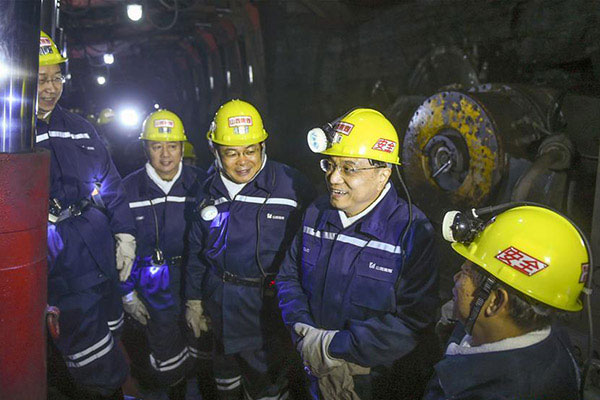
China must put “unyielding effort” into eliminating excess industrial capacity to make way for new growth engines, especially mass entrepreneurship and innovation, Premier Li said.
Premier Li made the remarks during the first inspection tour of 2016, on Jan 4 and 5, in North China’s Shanxi province, which is known for large coal reserves and output.
After visiting Taiyuan Iron and Steel Group, a world-leading stainless steel producer, Premier Li said the steel sector is suffering badly from excessive production and flagging demand.
“China should put unyielding effort into restructuring by eliminating outdated capacity and forbidding the construction of new capacity,” he said.
Strengthen policy measures
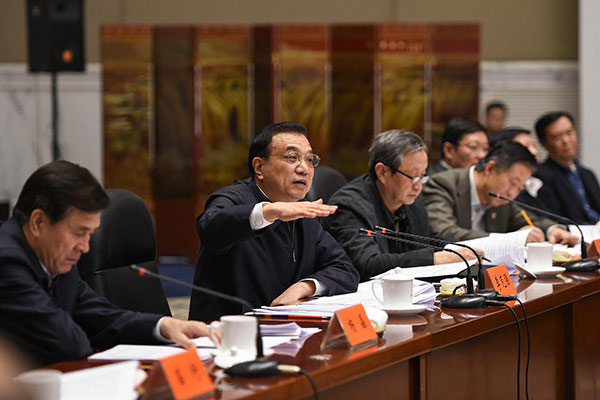
Speaking at a meeting aimed at finding viable solutions to resolve overcapacity in the nation’s iron, steel and coal industries in January 2016, Premier Li stressed that the central and provincial governments should strengthen supervision and policy support, and adopt different measures suitable for local conditions.
The Premier said stricter measures will be taken to control newly increased capacity and set clear goals in overcapacity reduction in the next three years, while the nation needs to set limits on the maximum amount of production for the iron, coal and steel industries based on market demand.
In March
Focus on iron, steel and coal industries
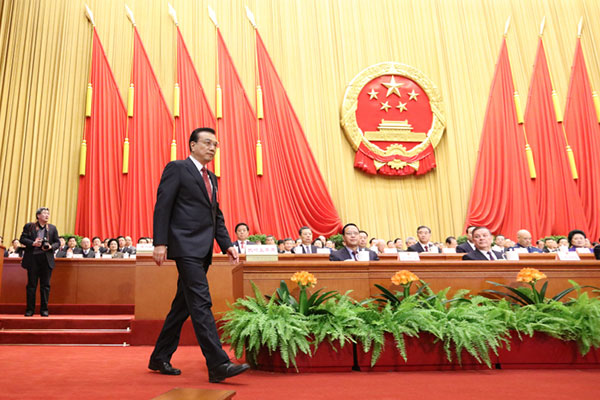
In the year’s government work report, Premier Li said the government plans to focus on addressing the overcapacity issue in steel, coal, and other industries facing difficulties. During the process, the market should serve as a check, enterprises should be the major actors, local governments should play a coordinating role, and the central government should provide support.
We will use economic, legal, technological, environmental, quality inspection and safety-related means to strictly control the expansion of production capacity and eliminate overcapacity in a deliberate manner, said the Premier.
Balance among overcapacity cuts, development and employment
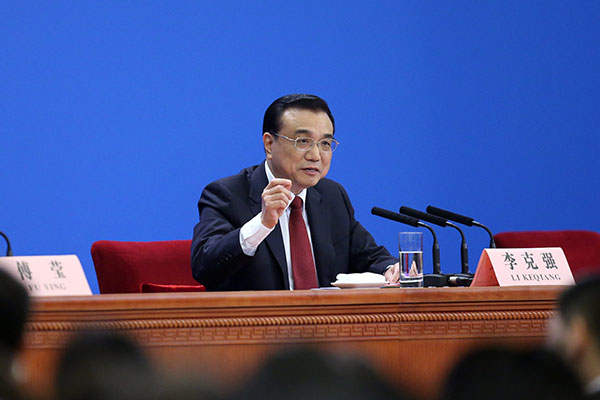
While meeting with Chinese and foreign press during the year’s two sessions on March 16, Premier Li said we need to achieve a balance in cutting capacity, promoting development and stabilizing employment in order to achieve a sustainable and healthy development in heavy industry, and avoid massive layoffs while cutting overcapacity.
To cushion the effect of job losses on families and society, the central government decided to allocate 100 billion yuan ($15.34 billion) to help the laid-off workers find new jobs. The fund can be increased if necessary and the local governments should do their own job accordingly, according to Premier Li.
In May
No job losses
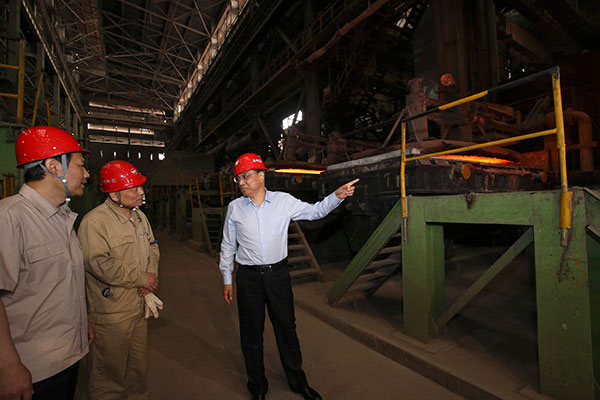
Premier Li said enterprises should ensure that redundant staffers don’t end up unemployed during the process of cutting excess production capacity, during an inspection tour to Wuhan Iron and Steel Corp (WISCO) on May 23. WISCO planned to cut steel production capacity by 4.42 million tons in 2016. We have to ensure basic pensions for laid-off workers, the Premier said.
“Reform is the fundamental way for SOEs to grow and prosper. But when cutting excess capacity, superfluous workers must be transferred to other jobs instead of being laid off,” Premier Li told the company.
SOEs administered by the central government in the coal, iron and steel sectors are due to cut 10 percent of production capacity this year, according to an executive meeting of the State Council presided over by Premier Li on May 18.
In June
Determination in overcapacity cuts
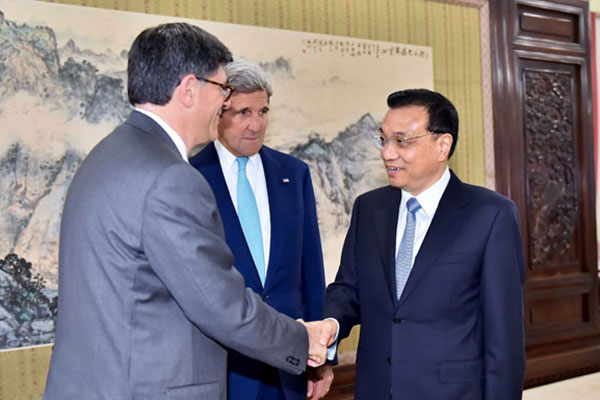
During his meeting with US Secretary of State John Kerry and Treasury Secretary Jacob Lew on June 7, 2016, in Beijing, Premier Li said that with the slowdown of the world economy, shrinking international trade and declines in market demand, overcapacity has become a common challenge faced by many countries.
China is determined to cut overcapacity by upgrading traditional industries and weeding out outdated ones, while keeping employment stable, he added.
Follow market principles
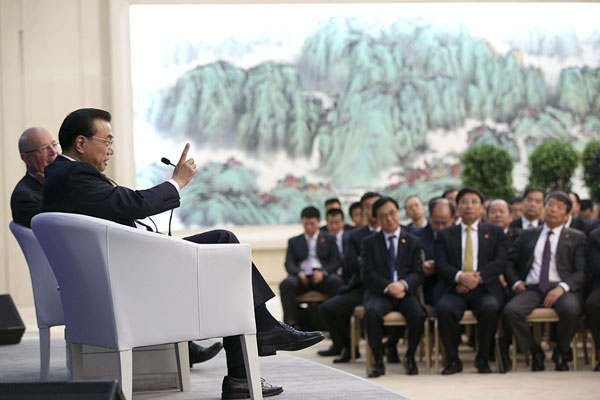
Premier Li emphasized the role of market principles in cutting overcapacity with more rigorous standards in quality, safety and energy consumption while meeting with Chinese entrepreneurs at the Summer Davos forum in Tianjin on June 28.
Overcapacity in some industries may be due to the sluggish world economic recovery, and low growth in international trade, said the Premier. “To tackle these problems we need the joint efforts of all countries.”
He said as a responsible big country, China will stick to market rules and the rule of law, take various measures to cut outdated capacity, re-assign redundant employees and secure their legal rights.
In July
Establish market mechanism
The market mechanism should be used to advance the capacity cut, which is a major task of the country’s supply-side structural reform drive, according to a statement released after a State Council executive meeting presided over by Premier Li on July 27.
Companies with excessive capacity should be offered support when carrying out restructuring, and those producing substandard products or failing to meet environmental and energy-saving requirements should be shut down, according to the meeting.
In August
Carry out inspection
The State Council executive meeting, presided over by Premier Li on Aug 16, decided to carry out a nationwide inspection on the steel, iron and coal industries to ensure overcapacity will be resolves on schedule.
It addition, it urged focusing on measures such as withdrawing capacity, sorting out illegal projects, strictly controlling newly-added capacities and resettling laidoff workers and establishing a public notification system and set up a punishment and reward mechanism.
In November
Severe punishment awaits cheaters
The State Council executive meeting, presided over by Premier Li on Nov 23, decided to send two inspection groups to Hebei and Jiangsu provinces to investigate any misconduct in cutting steel overcapacity.
At the meeting, Premier Li called for rewarding local governments and enterprises that have done well in their efforts to cut overcapacity, and he urged severe punishment on any cheaters.
Curbing overcapacity directly determines the speed and efficiency of economic restructuring. In the process, relationships among administrative power, rule of law and market forces should be handled properly, according to the meeting.
In December
Illegal steel producers won’t hurt goals for cutting capacity
Only by sticking to dissolving backward production capacity can the upgrades in economy be achieved, and backward capacity can no longer crowd out advanced ones, said Premier Li at an executive meeting.
The State Council meeting on Dec 21 focused on the illegal production of two steel producers in Hebei and Jiangsu provinces and heard reports about their punishment. While hearing the report, the Premier warned that some enterprises may lower standards while under construction, and the two illegal producers alerted the government to the needs of tightening management standards while relaxing the market access levels and strengthening supervision to create a fair market environment.
